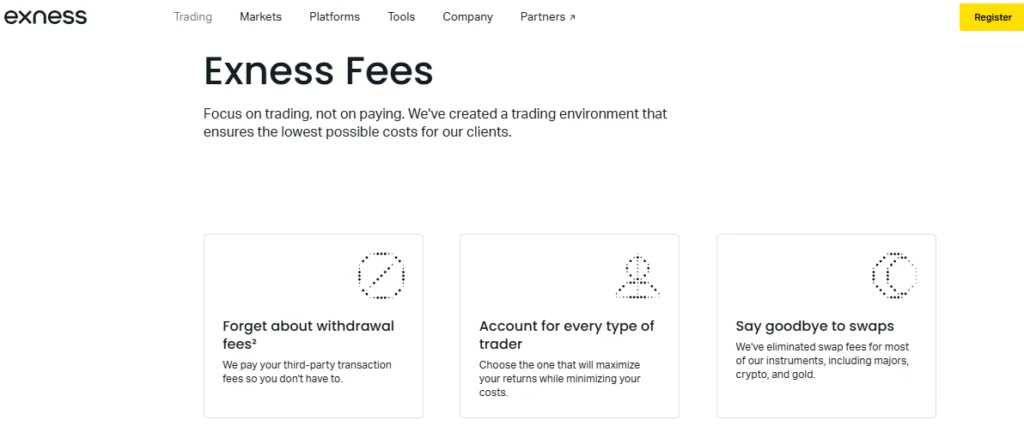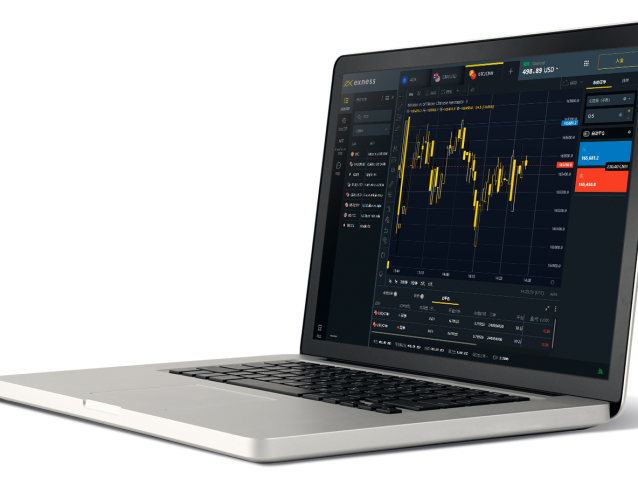Exness Overnight Fees
When you keep a trade open overnight on Exness, you might get charged an overnight fee. This fee is also called a swap or rollover fee. It’s applied at the end of each trading day, usually at 5 p.m. server time. The fee depends on things like the type of trade and interest rates. It can either be a cost or a credit, depending on your trade.
Definition of Overnight Fee on Exness
The overnight fee, charge, or credit happens when you keep and hold a position after the day’s trade has finished. This fee is applied to any open trades, on Exness, at 5 p.m. server time. The amount of fees depends on the disparity of interest rates between the two currencies in a pair or between the asset you are trading.
If you are buying a currency with a higher interest rate than the one you are selling, it is possible to receive a small credit. But if the reverse applies, you may be billed an overnight fee. Understanding this fee is necessary because it can factor into your overall trading costs or profits.

Overnight Fee Calculation Mechanism on Exness
Exness charges overnight fees based on the difference in interest rates between the two currencies in a pair or the type of asset you are trading. This difference is called the “swap rate.” The swap rate can either result in a fee (a charge) or a credit (a payment to you), depending on the direction of your trade.
If you are buying a currency with a higher interest rate than the one you are selling, you may receive a small credit. If you’re buying a currency with a lower interest rate, you might be charged a fee. The fee is applied every day at 5 p.m. server time, which is when the trading day ends.
The exact amount of the fee can change based on market conditions, so it’s a good idea to check it regularly before keeping a position open overnight.
Rates and Conditions for Applying Overnight Fees
Overnight fees on Exness depend on the type of asset you’re trading. Some assets have higher fees, while others may offer a credit instead of a fee.
Here’s a simple example of typical overnight fees for different instruments:
| Instrument | Overnight Fee (Buy) | Overnight Fee (Sell) | Conditions |
| EUR/USD (Forex Pair) | +0.25 USD | -0.35 USD | Based on interest rate difference |
| Gold (XAU/USD) | -0.15 USD | -0.10 USD | Affected by market conditions |
| US 30 (Index) | -0.10 USD | -0.05 USD | Varies with market volatility |
| Bitcoin (BTC/USD) | -0.20 USD | +0.30 USD | High volatility in the market |
As shown in the table, the overnight fees can be different for buying and selling. Forex pairs like EUR/USD often have higher fees because of the interest rate difference. Commodities like gold and indices usually have smaller fees. Cryptocurrencies like Bitcoin can have large fee changes because of market volatility.
These fees can change each day, so it’s important to check the latest rates before holding a position overnight.
Impact of Overnight Fees on Overall Profitability
Overnight fees can reduce your profits, especially if you keep positions open for a long time. These fees are charged when you leave a trade open overnight. If you hold a position for several days or weeks, the fees can add up and eat into your profits.
For example, if your profit is small, even a small overnight fee can cancel it out. In most cases, overnight fees are higher than the profits you make from small price changes. This means holding a trade overnight can reduce how much money you make in the long run.

While you might sometimes earn a small credit if the currency you’re buying has a higher interest rate, most traders end up paying more in fees than they earn. So, overnight fees can impact your overall profits.
Strategies for Minimizing the Impact of Overnight Fees
One way to mitigate the effect of overnight fees is the approach Tessier highlights:
- Close Your Positions Before Market Close: Closing your trades before the market closes each day is the easiest way to avoid overnight fees. That way you don’t hold positions overnight.
- Hold Over Weekends: Weekend charges are generally more expensive. Which means if you hold the trades open till Friday; you have to pay some extra fee over the weekend.
- Another Tip: Trade Instruments That Have Lower FeesSome assets pay higher overnight fees, for instance some currencies. Look for assets with lower fees, like commodities or indices.
- Hedge Your Positions: Hedging involves opening an opposite trade to offset the costs of overnight fees. This can help reduce the impact of fees.
- Watch Interest Rates: In forex trading, the difference in interest rates between two currencies affects the overnight fee. Choose pairs where the currency you’re buying has a higher interest rate to earn a credit instead of paying a fee.
- Look for Swap-Free Accounts: Some brokers provide swap-free accounts, which don’t incur overnight fees. This is a positive option if you are trying to minimize costs.
Employing these strategies will have less effect on the overnight fees, retaining the majority of the profits. So be sure to check before leaving a trade open overnight.
Frequently Asked Questions (FAQ)
What is an overnight fee on Exness?
An overnight fee on Exness is some commission (or sometimes a credit) that you pay or receive if you keep one of your trades open overnight. Each trading day, it occurs (usually at 5 p.m. server time). The fee varies based on how widely apart the interest rates are between the two currencies you’re trading — or the asset you’re holding.
How are overnight fees calculated on Exness?
In forex trading, overnight fees are determined by the interest rate differential of the particular currency pair or pair in question. If you’re buying a currency that has a higher interest rate than the currency you’re selling, you may receive a slight credit. If you’re purchasing a currency with a lower interest rate, you’re hit with a charge.
Are overnight fees the same for all instruments on Exness?
No, overnight fees are different for each instrument. Forex pairs usually have higher fees because of interest rate differences. Other instruments, like commodities or cryptocurrencies, can have different fees. It’s important to check the overnight fee for each asset before holding a trade overnight.
How can overnight fees affect my trading profits?
Overnight fees can reduce your profits. If you keep a trade open for several days, the fees can add up and eat into your gains. Even a small fee can cancel out a small profit. However, if the currency you’re buying has a higher interest rate, you might earn a small credit instead of paying a fee.
You may also be interested in:
